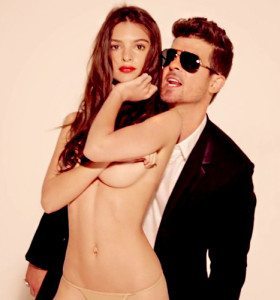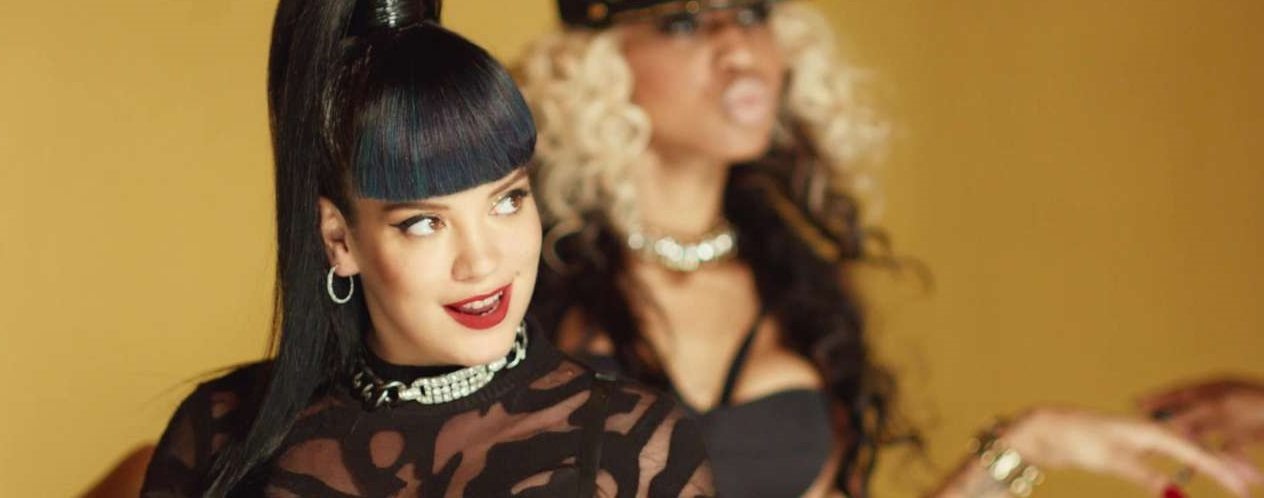It’s Hard Out Here: Objectification in the Music Industry
photo: flavorwire.com
It is undeniable that Lily Allen’s much-anticipated song ‘Hard Out Here’ – and its accompanying music video – caused controversy upon its release last month. This was without a doubt Allen’s intention, considering that it was her first solo release following a four year hiatus. The song is her attempt to starkly demonstrate how women are objectified in the music industry; an objectification that is considered normal and remains largely unchallenged.
When flicking through music channels, one thing becomes apparent: in many videos, women are often negatively portrayed, via what some would claim to be demeaning positions. From Robin Thicke’s ‘Blurred Lines’ to Miley Cyrus’ ‘Wrecking Ball’, 2013 was certainly the year of raunchy music videos. It is clear that the oft-repeated mantra “sex sells” has truth to it. But is there a higher price? Are these women really as “liberated” as many would claim to be, or are they just being exploited under the guise of sexual liberation? Allen would argue the latter.
The feminist message in Allen’s song and video is apparent. The video is an obvious parody of the music videos which appear on our screens daily. That is why I find it disappointingly ironic that many people have missed the whole point of ‘Hard Out Here’. Instead of focusing on the wider issue of the pressures women face in the music industry, the debate has seemed to revolve around the types of women Allen chose to feature in her video – with some even accusing her of being racist. This is obviously not the case. When watching the video, one can see appearances of women of all backgrounds.
Even more ludicrously, some have accused Allen of hindering her cause by creating such an explicit video. She did the right thing by accompanying her powerful song with an equally powerful video which demonstrates directly what we accept daily. She wants  us to feel uncomfortable. She wants us to feel outraged. How are we supposed to tackle the problem when many are unaware that the problem even exists? As Jameela Jamil states in support for Allen, “how else can you show what you are revolting against, without SHOWING IT? When we see movies about War, Murder or Crime, we don’t kick off that they showed the perpetrations. We understand that we are being told a story clearly to identify the evils.”
us to feel uncomfortable. She wants us to feel outraged. How are we supposed to tackle the problem when many are unaware that the problem even exists? As Jameela Jamil states in support for Allen, “how else can you show what you are revolting against, without SHOWING IT? When we see movies about War, Murder or Crime, we don’t kick off that they showed the perpetrations. We understand that we are being told a story clearly to identify the evils.”
By criticising the current state of the music industry and media in general I am not attempting to advocate a conservative stance; quite the opposite. People can do what they want and wear what they want in the process. There is absolutely nothing wrong with being “sexually liberated” or “empowered”, but this is not where the issue lies. The problem is whether these women truly are individually empowered, or whether they are being exploited. If the latter is the case, the situation becomes much more sinister. Many would argue that “exploitation” is too strong a word, and can be refuted by pointing out that Cyrus and the girls in Thicke’s video were willing participants. However, it is undeniable that in a society obsessed with physical appearance, there are certain pressures on artists to look and act in certain ways, or risk losing out to those who are willing to do so.
The problem is whether these women truly are individually empowered, or whether they are just being exploited. If the latter is the case, the situation becomes much more sinister.
Two facts cannot be ignored: the music industry is still largely dominated by male figures, and female artists are disproportionately sexualised. Charlotte Church recently spoke out about what she coins “a male dominated industry with a juvenile perspective on gender and sexuality”. Church claimed that such an industry pressures artists like her “to present themselves as hyper-sexualised, unrealistic, cartoonish, as objects, reducing female sexuality to a prize you can win.” Sinead O’Connor took this a step further in an open letter to Miley Cyrus, pleading with her to stop “prostituting” herself, as it is obscuring her “obvious talent” and Cyrus herself is not the main person profiting from her antics.
The sad thing is that often these women are then shamed and criticised in the media for how they act and dress, even though they are conforming to society’s expectations. This is not a simple “men versus women” issue; it is a criticism of the industry as a whole. I am not condemning the women involved, nor do I believe that all men try to subjugate women. Nevertheless, although men are not exempt from the pressures of the music industry, the issue is undeniably much more widespread for women. The trend seems to be an increased focus on image, rather than the music itself. Of course, this is not applicable to the entire industry. Artists such as Adele and Ben Howard demonstrate that there is – arguably – still some musical integrity left. However, it is sad that today these artists seem to be exceptions to the rule.
It is easy to ignore songs like ‘Hard Out Here’ (and articles like this) and flippantly label them as “feminist” in agenda: a title which nearly immediately signifies negative connotations. However, we must think about the messages that the music industry and media are giving to young girls and boys today. The media socialises girls into thinking that their value lies in their appearance, and boys into thinking that being a man is about power and control. By confronting the issue in such an overt way, Allen gives me hope that one day these damaging conceptions will be dismantled. You may not like the way that she tackled the issue, but at least she is trying to actively tackle it.

Comments